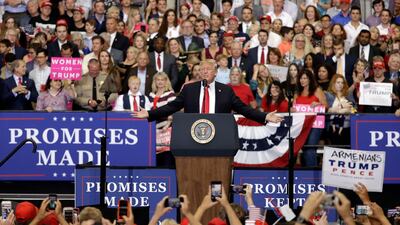I previously explained here how Donald Trump had begun to de-institutionalise the US political system by attacking the credibility and functionality of civic and political institutions that can balance the authority of the presidency, check his power or threaten his position.
Since then, that process has greatly accelerated, though few Americans fully understand what’s going on. As demonstrated in numerous formerly democratic countries, by the time most people realise de-institutionalisation is even underway, incalculable and possibly irreversible damage is already done.
Mr Trump's first and favourite target was the news media. Ironically, he’s largely a creature of the media, a self-generated caricature who, in that sense, is essentially a figment of his own imagination.
His career as a property developer largely collapsed when his casinos went bankrupt in the 1990s. But he re-emerged as a branding franchiser selling the Trump name and then made it big as the star and producer of the reality TV show The Apprentice.
For decades, Mr Trump used the media to exaggerate his persona. Using the false names John Barron and John Miller, he planted absurd falsehoods about his financial and romantic exploits in tabloids and gossip columns.
When he ran for the presidency, Mr Trump exploited his skill as a controversial figure to gain vast quantities of free advertising as news channels broadcast endless hours of his political rallies. Without the media, he might not have become president or, probably, at all noteworthy.
Once elected, he made the media his principal foil (Steve Bannon, his former White House strategist, called the press "the opposition party"), denouncing them with Stalinist vitriol as "the enemy of the American people".
He doesn’t hide his motives. Veteran journalist Leslie Stahl reports that Mr Trump told her: “I do it to discredit you all and demean you all so when you write negative stories about me, no one will believe you.”
That’s the logic of de-institutionalisation. Since the press can pose a threat, it must, as an institution, be discredited, lest journalists reveal inconvenient or embarrassing facts.
Mr Trump is not only at war with the press but with truth itself. As president, he has already told thousands of brazen lies, now averaging about eight falsehoods a day, according to the Washington Post, most recently falsely and angrily accusing journalists of inventing a source, who turned out to be his senior Asia official, Matthew Pottinger.
The war against journalists was evident from the beginning of his presidency. But well into the second year, the prime targets now include the FBI, the intelligence community, including the CIA and the rest of the national security establishment.
For years, the American political right has contrived a paranoid fantasy that the country is secretly ruled by an all-powerful, unelected and unaccountable "deep state" cabal. Such "deep states” have indeed existed in some authoritarian countries, where shadowy military or intelligence officials, rather than formal or elected leaders, make key decisions.
But there is no "deep state" in Washington. There is a government with administrators and officials but the "deep state" is a conspiratorial delusion.
Mr Trump reportedly used to avoid this buzzword because he didn’t want to sound like "too much of a crank”. But now he has unleashed a series of tirades against the police and national security officials, labelling them a “criminal deep state” and accusing them, without evidence, of having embedded a "spy" in his presidential campaign for nefarious political purposes. He has dubbed this imaginary conspiracy against him "spygate”.
____________________________
Read more from Hussein Ibish:
Trump's art of the deal has failed him in Pyongyang and Tehran
Palestinians need a Gandhi-like figure to oppose Israeli rule
Does Washington have the power to prevent nuclear weapon proliferation?
____________________________
Mr Trump has long purveyed wacky conspiracy theories and rose to prominence by championing the laughable claim that Barack Obama wasn’t born in the United States. But now the scope is hugely expanding.
Last year he falsely accused Mr Obama of wiretapping him. Now he’s painting the entire law enforcement and national security establishment as a criminal gang determined to bring him down. There is no evidence whatsoever for these unprecedented accusations.
Mr Trump's intention is again clear: he is pre-emptively discrediting the FBI, Department of Justice and special counsel Robert Mueller, who is investigating the last election, to undermine anything they might reveal. He has even accused Mueller's investigators of "meddling" with the upcoming midterm elections, without saying how and, as always, with no evidence.
Undoubtedly Mr Trump thinks he's just fending off enemies so his probable next target is alarmingly obvious. An independent judiciary is an enormous obstacle and threat to any leader. The courts must be next, as telegraphed by his highly partisan and personal recent pardons.
The logic of de-institutionalisation is simple. There’s only one legitimate authority: the leader. Therefore, independent, autonomous institutions, whether within the government or civil society, are the adversary. They must be stigmatised and de-fanged or destroyed, after which there is no system left, only a leader.
This terrifying process has wrecked democracy, accountability and rule of law in numerous countries. De-institutionalisation is just beginning in the United States and there’s no way of knowing how far it can go. But it really is happening.
Hussein Ibish is a senior resident scholar at the Arab Gulf States Institute in Washington


